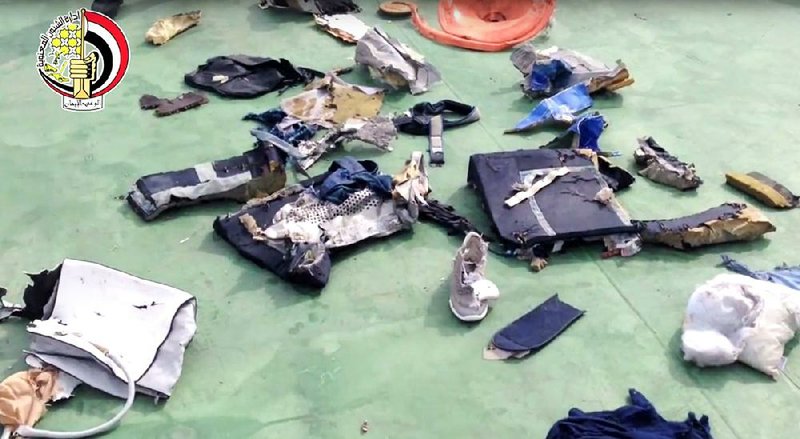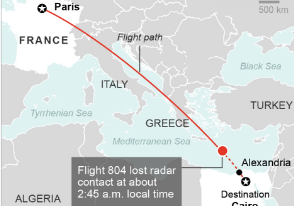CAIRO -- Smoke was detected in multiple places on EgyptAir Flight 804 moments before the plane plummeted into the Mediterranean Sea, but the cause of the crash that killed all 66 on board remains unclear, the French air accident investigation agency said Saturday.
Also Saturday, the Egyptian military released the first images of items recovered from the downed plane. Debris included passengers' personal items and damaged seats.
Agency spokesman Sebastien Barthe told The Associated Press in Paris that the plane's automatic detection system sent messages to ground stations indicating smoke a few minutes before the plane disappeared from radar as it flew over the east Mediterranean early Thursday morning.
The messages, he explained, "generally mean the start of a fire," but he added, "We are drawing no conclusions from this. Everything else is pure conjecture."
Egypt's military released the first photographs of debris from Flight 804. Photos posted on the chief military spokesman's Facebook page appear to show heavily damaged remains of plane seats and life jackets, and a scrap of purple-and-pink cloth that could be part of a blanket or sleeping bag.
Military spokesman Brig-Gen. Mohammed Samir later posted a brief video that showed more debris, including what appeared to be a piece of blue carpet, seat belts, a shoe and a woman's white handbag. The short video opened with aerial footage of an unidentified navy ship followed by a speedboat with five service members aboard heading toward floating debris.
In Athens, Greek Defense Minister Panos Kammenos said a seat, luggage and "a body part" also were found.
The European Space Agency said a satellite had detected a possible oil slick in the same area as the debris. Greek state television said the items were found about 115 miles from the plane's last tracked position.
Barthe's statement that smoke was detected aboard the flight came after a report by an industry publication that sensors on the plane had detected smoke in a lavatory, suggesting a fire on board the aircraft before it went down.
The publication cited information transmitted through the plane's Aircraft Communications Addressing and Reporting System, which transmits data from the plane to the ground in a series of messages.
Two error messages, the first at 2:26 a.m., suggested that there was a fire on the plane. Later alerts, however, indicated some type of failure in the plane's electrical equipment.
Similar signals have preceded air accidents in the past, but they weren't associated with the planes' sudden disappearance from radar, as occurred with the Airbus A320 over the Mediterranean.
A Malaysian Airlines plane that was shot down over Ukrainian airspace in July 2014 broke apart so quickly that onboard systems didn't have time to send distress messages.
"It's too long for an explosion and too short for a traditional fire," said John Cox, a former A320 pilot, about the EgyptAir plane's signal. Cox, president of the Washington-based consultancy Safety Operating Systems, said: "It says we have more questions than we have answers."
Spanning three minutes, the warnings were followed by alerts that fumes were detected by smoke detectors, one in a lavatory and the other in the compartment below the cockpit where the plane's computers and avionics systems are stored, according to the Aviation Herald. CNN reported that the time stamps of the alerts match the approximate time the aircraft disappeared.
In the case of a midflight fire, the pilots would have been expected to radio a distress call and begin attempts to divert the plane, Cox said. No such radio calls came from the EgyptAir plane.
The transmissions, which are automatically sent to ground stations so airlines can monitor whether a plane needs maintenance, will be checked against the plane's crash-resistant flight recorders if and when they are found.
David Learmount, an aviation expert and editor of Flightglobal magazine, said the readings reported by the Aviation Herald suggested a quick-spreading fire.
"The question now is whether the fire that caused the smoke was the result of an electrical fault -- for example a short-circuit caused by damaged wiring -- or whether some form of explosive or incendiary device was used," he wrote on his website.
In the absence of a claim of responsibility, it's unclear whether the crash was the result of a fault or an attack, he wrote.
"That answer is unlikely to be forthcoming soon."
Another aviation expert, Egyptian Hossam Elhamy Shaker, said the detection of smoke does not solve the mystery of the crash.
"It just leads us into an area where smoke is a major contributor to the incident, either by destroying the aircraft's equipment or suffocating the pilots," he told the AP.
Investigators have been poring over the passenger list and questioning ground crew members at Charles de Gaulle Airport in Paris, from which the plane took off.
The aircraft had been cruising normally in clear skies on a nighttime flight to Cairo early Thursday when it lurched left, then right, spun all the way around and plummeted 38,000 feet into the sea. The pilots never issued a distress signal.
Search crews are hunting additional plane wreckage. Experts said answers to the many questions will come only after an examination of the wreckage and the plane's cockpit voice and flight data recorders, commonly known as black boxes.
Planes and vessels from Egypt and five other countries -- Greece, Britain, France, the United States and Cyprus -- continued Saturday searching a wide area of the eastern Mediterranean. On Friday, the Egyptian military found debris from the passenger jet in the sea 180 miles north of the Egyptian port city of Alexandria.
The water in the area is 8,000 to 10,000 feet deep. Pings from the black boxes can be detected up to a depth of 20,000 feet.
Egyptian authorities said they believe terrorism is a more likely explanation for the crash than equipment failure. Some aviation experts have said the plane's erratic motion suggests a bomb blast or a struggle in the cockpit. But, so far, no hard evidence of that has emerged.
No militant group has claimed responsibility for the crash. That is in contrast to the downing of a Russian jet in October over Egypt's Sinai Peninsula that killed all 224 on board. In that case, the Islamic State group's branch in Sinai issued a claim of responsibility within hours. On Friday, the Islamic State issued a statement on clashes with the Egyptian military in Sinai but said nothing about the plane crash.
At Charles de Gaulle Airport, French aviation investigators have begun to check and question all baggage handlers, maintenance workers, gate agents and other ground crew members who had direct or indirect contact with the plane before it took off, a French judicial official said. The official was not authorized to discuss the investigation and spoke on condition of anonymity.
At the Paris airport, dozens of passengers, mostly Egyptians, lined up for the afternoon EgyptAir flight to Cairo. Flight crew members and pilots passed through a security post to have their luggage scanned. The checks were thorough, but there were no outward signs of extra security in the waiting area as passengers boarded the plane as usual. However, a team of French security officials entered the plane and walked along the aisles before takeoff.
In Paris, French Foreign Minister Jean-Marc Ayrault said Saturday that he and other officials -- including representatives of Paris Aeroport, the French prosecutor, EgyptAir and the Egyptian ambassador to Paris -- had met with about 100 family members of the Flight 804 passengers to express "our profound compassion" over the crash.
In a statement delivered to reporters after the meeting, he said, "All the hypotheses are being examined -- none are being favored."
Information for this article was contributed by Hamza Hendawi, Raphael Satter, Angela Charlton, Brian Rohan and Philippe Sotto of The Associated Press; by Andrea Rothman, Alan Levin, Tarek El-Tablawy, Blaise Robinson, Deena Kamel Yousef, Benjamin Katz, Salma El Wardany, David McLaughlin, Zaid Sabah and Abdel Latif Wahba of Bloomberg News; and by Heba Habib, Erin Cunningham and Sudarsan Raghavan of The Washington Post.
A Section on 05/22/2016

